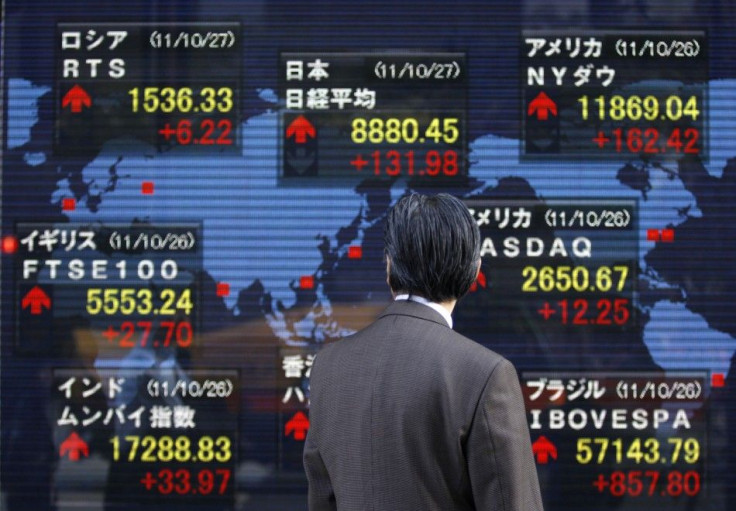Nikkei, Most Asia Markets Close Lower Monday on North Korea Leader's Death

(REUTERS) - Japan's Nikkei share average fell to a three-week low on Monday, hurt by news that North Korean leader Kim Jong-il had died and as worries over Europe's debt crisis increased after Fitch Ratings warned of possible downgrades for seven European nations.
News of the death of North Korean leader Kim Jong-il raised fears of regional instability, while the euro zone's debt crisis continued to keep investors away from risk assets.
Asian equities in general and U.S. stock index futures fell, with South Korean shares tumbling as much as 5 percent, while the dollar gained on safe-haven appeal.
The benchmark Nikkei closed down 1.3 percent at 8,296.12, after earlier falling as low as 8,272. The broader Topix index lost 1 percent to 716.38.
North Korea's leader Kim died of a heart attack while on a train trip, state media reported, sparking immediate concern over the political stability of the reclusive state and its nuclear programme.
South Korea's reaction to this will be in focus. The risk or fear that the death of Kim Jong-il will lead to provocation by North Korea is prompting selling, said Hiroyuki Fukunaga, CEO of Investrust.
Investors shed positions as they awaited further news out of North Korea, while strategists said the fall was limited for now.
Investors are taking a wait-and-see approach to see if the situation in North Korea will take a turn for the worse, and market participants are not able to grasp the whole situation yet. For now, people are getting rid of their positions, said Masayuki Otani, chief market analyst at Securities Japan.
Tokyo stocks extended losses on the North Korean news after worries about Europe had pushed the Nikkei lower in the morning, wiping out any improvement in sentiment that had been made on the back of encouraging U.S. economic data last week.
Fitch Ratings warned on Friday it may downgrade France and six other euro zone countries, saying a comprehensive solution to the region's debt crisis was technically and politically beyond reach.
The Nikkei remained below its 25-day moving average near 8,476 on Monday, now seen as a key resistance point.
Market participants expected support to come from the Bank of Japan's buying of exchange-traded funds and from
bargain-hunting by pension funds.
The MSCI's broadest index of Asia Pacific shares outside Japan was down 2.14 percent by 0904 GMT. Southeast Asian markets seemed to focus more on local factors, plus better recent economic data from the United States.
Our long-held view of no U.S. double-dip recession is holding firm with recovering momentum in the United States, said CIMB Research regional strategist Chang Chiou Yi.
The Indonesian market was poised for a strong gain in 2012 following a recent credit rating upgrade by Fitch to investment grade that reflected structural improvements, Chang said.
In a choppy session, Jakarta's Composite Index ended up 0.05 percent. PT Bank Mandiri Tbk gained 1.5 percent as it was among eight banks also upgraded by Fitch.
Faring worst on the day, Singapore fell 1.55 percent to its lowest in more than two months. The city-state, seen as having greater exposure to global markets, fell 1.3 percent last week, the worst performance among the main Southeast Asian stock markets.
Stocks of banks and commodity firms such as Noble Group in Singapore were amongst the worst hit. Noble shares dropped 3.5 percent.
Malaysia's main index ended up 0.8 percent while Thailand's SET index ended flat.
Philippine shares inched up 0.31 percent and Vietnam's Ho Chi Minh Stock Exchange index edged up 0.37 percent amid buying in bank stocks.
Shares in Philippine National Bank shot up 9.4 percent.
Manila Standard Today newspaper reported that the boards of Philippine National Bank and Allied Banking Corp had approved a merger that would create the country's fourth-largest bank with combined assets of 540 billion pesos ($12.32 billion).
In Jakarta, top cement maker PT Semen Gresik Tbk surged 4.8 percent after data showed that domestic cement sales, a key indicator of economic growth in Southeast Asia's top economy, rose 26 percent in November.
In Bangkok, big banks, among the top listed stocks held by most investment funds, gained, led by a 0.4 percent rise in Kasikornbank Pcl. Fund managers bought shares to meet demand at the year-end for retirement mutual funds (RMF) and long-term equity funds (LTF) that offer tax breaks.
There's good inflows from the LTFs and RMFs. Foreign participation in the market was weaker because of the holiday season, said Viwat Techapoonphol, senior strategist of broker Tisco Securities.
(Additional reporting by Mari Saito, and by the Singapore bureau; Editing by Alan Raybould.)
© Copyright Thomson Reuters 2024. All rights reserved.











